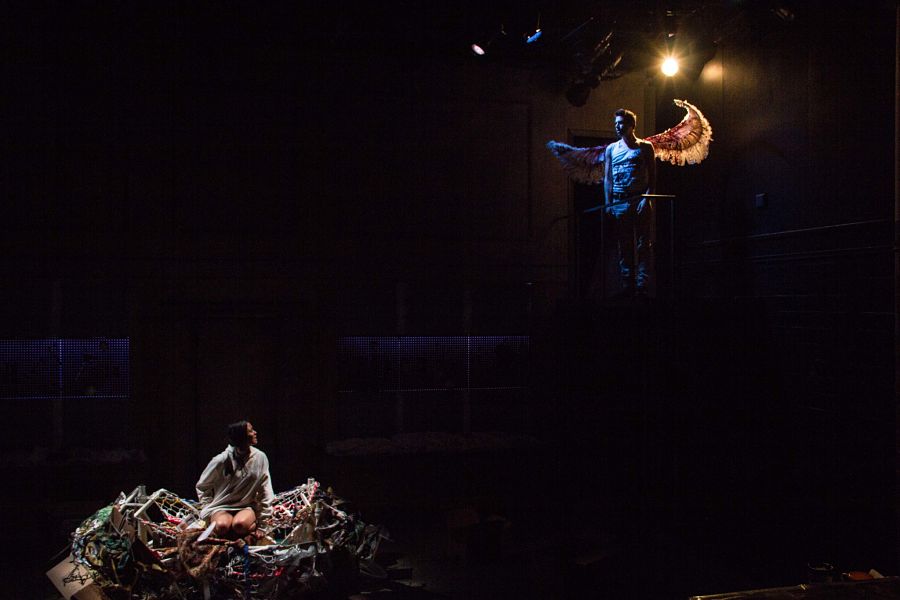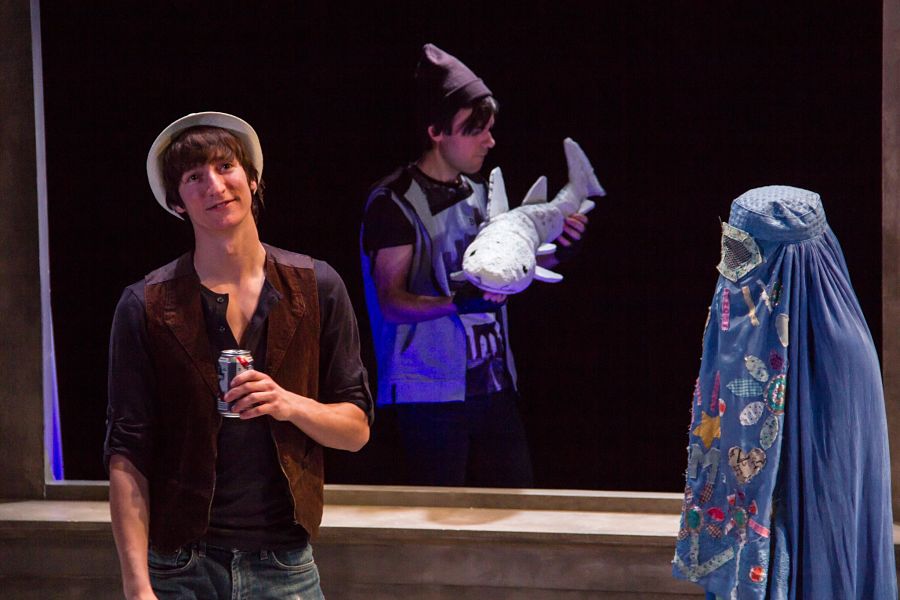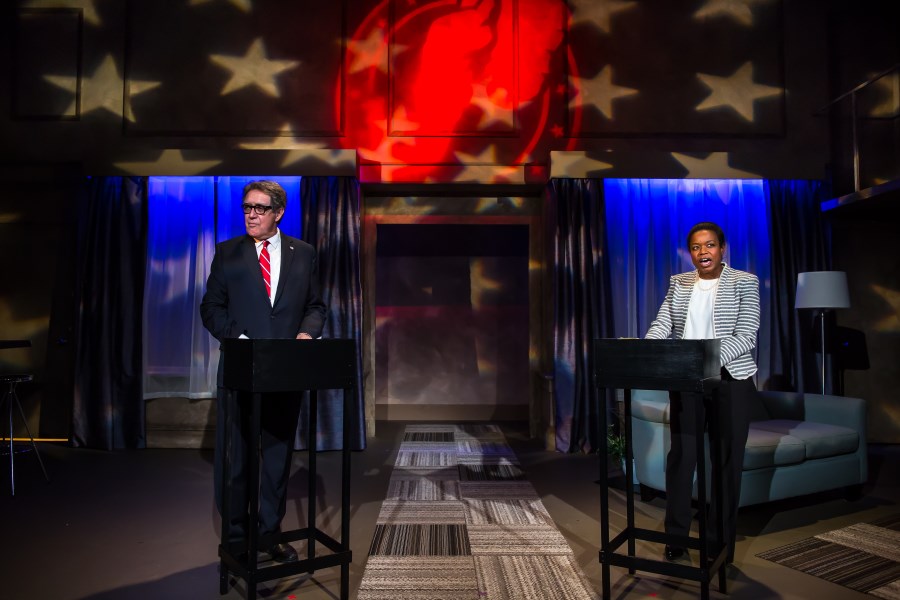Somehow it seems every city in America is hopping on the women’s theatre festival train, from the D.C. Women’s Voices Festival to the Philadelphia Women’s Theatre Festival and many more. Yet as the numbers still harshly suggest, plays by women are still making it onto mainstages at a much slower pace.
Enter Women’s Project’s Pipeline Festival. The new event is presenting five plays in various stages of development, all written, directed, and produced by the 15 members of the Women’s Project Lab. The festival runs March 24—April 23 at the McGinn/Cazale Theatre, with a new play going up each week.
This isn’t just another women’s new-play festival, points out Women’s Project producing artistic director Lisa McNulty, who confesses frustration with the “version of advocacy for women that ends up with women in festivals or women on the second stage or women in development. So it was really important to create a version of this that would showcase female collaborative teams with enough production support so people could see the work, but then take it away and produce it themselves.”
The Lab consists of a two-year residency at the theatre, with the Pipeline Festival as the final project. In previous years, the culminating presentation was one production put together by all the members of the group. But when McNulty joined the company as artistic director in 2014 (she had previously worked there in different capacities twice), she wanted to find a way to more clearly showcase each member’s individual talents.
The event takes its name from the omnipresent buzzword for the too-often-repeated canard that there aren’t enough plays by women available to be produced; but the festival takes it a step further to lift up female directors and producers as well. In fact, the Lab originally started in the 1980s as a program for directors, and only later were playwrights introduced. Now there are five producers, five playwrights, and five directors in the program. So McNulty—along with Lab alums Shelley Butler, who serves as the director liaison, and Stephanie Ybarra, who serves as the producer liaison—grouped the artists into what they affectionately call “pods,” the teams behind each play.
“The thing that’s most powerful for me is creating this badass cohort of women who I feel like will be working together forever,” McNulty says. “They’re making really primary collaborative relationships, and that feels really powerful to me in a field that doesn’t particularly take note of female collaboration.”
In fact, producer Rachel Sussman has already worked with director Lee Sunday Evans before—they collaborated on a reading last fall and have another project coming up. Their Pipeline show, Riti Sachdeva’s The Rug Dealer, runs this weekend, April 14-16.
“I knew Lee and Lee knew Riti, but Riti and I didn’t know each other very well,” Sussman says, who adds that the five producers have discussed coproducing opportunities in the future. “If you don’t have women at the top who are producing the work, how are you ever going to expand the number of works by and about women that get produced?”

Each pod receives two weeks of rehearsal, two and a half days of tech, and four performances. The Women’s Project is dedicating one full show budget to the festival, but, as McNulty notes, managing rehearsal and production schedules for five plays rather than one is a “puzzle.” The theatre only has one official rehearsal space, which means that the show in its first week of rehearsal is in McNulty’s office, while the show in the second week is in the rehearsal room and the show in tech is in the theatre. McNulty adds that it’s been very helpful to have “five producing partners” in the producing fellows, and it has also been a lesson for them in working with a nonprofit.
“To be able to actually navigate producing for and with an institution as well as spearheading these separate individual projects has been really eye-opening,” says Kristen Luciani, who produced Veil’d, which ran March 31–April 2. “It’s also been really educational in how you collaborate and coordinate and communicate between the institution the producer and the creatives of the show.”
The productions have varying levels of design. There is a basic “scenic envelope” that is the same for all the shows, and the directors work with the designers to modify and enhance the backdrop to fit their specific piece. Many of the designers are working on multiple plays, as well, and the look and sound of each piece has been crucial to the development.
Playwright Sarah Burgess admits she didn’t have much interaction with the designers. But there is a moment in her play, Kings, when sound design informed her writing process. During a political debate scene, Burgess wondered whether it would be more effective to have recorded crowd sounds or not, and was able to try it both ways during her show’s run. Seeing how the audience reacted will help her shape the work. “Nothing replaces what it’s like to hear 100 people in that theatre all reacting to something,” she adds.

The plays are in various stages of development. Actors were off-book for Cygnus, written by Susan Soon He Stanton, directed by Danya Taymor, and produced by Liz Olson, and Veil’d, written by Monet Hurst Mendoza and directed by Sarah Krohn. But in Kings, directed by Adrienne Campbell-Holt and produced by Pearl Hodiwala, and The Rug Dealer, the actors had scripts in hand. For the final play, Martyna Majok’s Queens, directed by Tamilla Woodard and produced by Rachel Karpf Reidy, the actors will be sitting in chairs onstage with scripts in hand.
Queens, which was still untitled when the festival was announced, is in extremely early stages of development, and Woodard is even eschewing music stands for the presentation, as she doesn’t want to put something between the words and the audience.
“If the director’s medium is the pictures that we’re creating onstage, then that’s not really on display here,” Woodard says. “But us as collaborators is—the strength of the collaboration, the trust that has to exist in a room. We’re all kind of doulas for this play.”
Woodard, Majok, and Reidy were originally working on Majok’s Cost of Living for the festival, but the play got picked up for production at the Williamstown Theatre Festival this summer, so Majok decided to pursue a different idea. She also has her New York debut, Ironbound, playing at Rattlestick Playwrights Theater in a coproduction with Women’s Project at the same time; balancing that with a writing and development process has been challenging.
“I started with only 50 pages of a play—something less than a first act,” Majok says, then adds, “I’m inspired and excited by how it’s turning out—I’ve had a great time unfurling this story with these incredible artists. I’m essentially writing characters for the actors in our room.”
Burgess has been in a similar position, as she too is currently having her New York debut at the Public Theater with Dry Powder. While she had been thinking about writing a play about lobbyists for a while, the Pipeline Festival gave her a real reason to start and a deadline to work toward. “Dry Powder opened the week we started rehearsal here,” she says. “There were some things that were really great about having a very concrete commitment to doing a bit of development on your next play right as something you’ve been working on for a couple of years opened. I’m sure I wouldn’t have immediately thrown myself into that without an outside reason.”
McNulty has made a very concerted effort to get industry members to all of the presentations, as the goal is that these plays will go on to be produced elsewhere. Each show has a 3 p.m. matinee on Friday (complete with a free glass of wine for industry members), and McNulty is also sending the plays to artistic leaders across the country, as each of the groups have assembled wish lists of which theatres and artists they think would be right for the projects.
Ultimately, the goal is to push these plays and these women out of the pipeline and onto stages in full productions. When asked what she wanted to get out of the festival, Woodard replied frankly: “I want people to hire me.”


